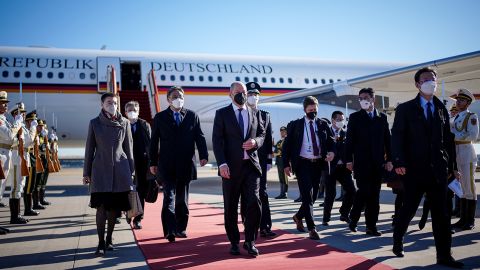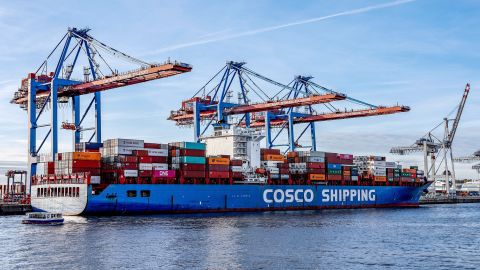Hong Kong/London
CNN Business
—
German Chancellor Olaf Schulz arrives Friday in China with a team Executives, send a clear message: partner with the world’s second largest business The economy must continue.
After arriving in Beijing on Friday morning, Scholz met with Chinese leader Xi Jinping at the Great Hall of the People in Beijing and was received by Premier Li Keqiang in the afternoon.
Joining Scholz on the whirlwind one-day visit was a delegation of 12 German industrial giants, including Volkswagen (VLKAF), Deutsche Bank (DB), Siemens (SIEGY) and chemical giant BASF, according to people familiar with the matter. (BASFY) CEO. with this matter. They are expected to meet behind closed doors with Chinese companies.
When the group entered China, most entrants did not undergo the mandatory seven-day hotel quarantine standard. Images show medical workers in protective suits greeting Scholz’s jet at Beijing Capital International Airport to be tested for Covid-19 after the official delegation arrives.
During a meeting between the leaders of the two countries on Friday morning, Xi called on Germany and China to work together in a “complex and volatile” international situation, saying the visit would “enhance mutual understanding and trust, deepen practical cooperation in various fields, planning the next phase of Sino-German relations,” according to state broadcaster China Central Television.

Scholz’s visit — the first to China by a G7 leader in about three years — comes as Germany slides into recession. But it has raised concerns that the interests of Europe’s largest economy remain too closely aligned with those of Beijing.
Since Moscow invaded Ukraine this year, Germany has been forced to abandon its long-standing dependence on Russian energy. Beijing declares its friendship with Moscow “without limits”, while Relations between China and the United States are deteriorating.
Now, some in Scholz’s coalition government are increasingly tense over Germany’s relations with China.
Such tensions have been underscored recently by a heated debate over the acquisition of a 35% stake in the operator of one of the four terminals in the Port of Hamburg by Chinese state-owned shipping giant COSCO. Under pressure from some government members, the scale of investment was capped at 24.9 percent.
Potential deal raises concerns in Germany Closer ties with China would expose critical infrastructure to political pressure from Beijing and benefit Chinese companies enormously.
But Germany can barely swing with Beijing As it grapples with the challenge of reviving a struggling economy. Its consumers and companies bear the brunt of Europe’s energy crisis, with a deep recession looming.
Decoupling of the EU and Germany from China would result in a “huge GDP loss” for the German economy, Lisandra Flach, director of ifo’s Center for International Economics, told CNN Business.
Kiel Institute for World Economic Research estimates A sharp reduction in trade between the EU and China would reduce Germany’s GDP by 1%.
Germany needs to shore up its export markets as relations with Russia, once a major gas supplier, continue to unravel.
Rafal Ulatowski, assistant professor of political science and international studies at the University of Warsaw, said that when it comes to China, Germany would not want to “also lose this market, this economic partner”.
“them [will] Try to maintain these relationships as much as possible. ”
China has openly maintained its “neutrality” in the war while stepping up trade with Moscow as Western nations impose ever-changing economic sanctions on Russia.
this triggers One Faced with backlash in Europe, some companies have become wary of doing business in China due to China’s strict “zero outbreak” restrictions.
Berlin is also under increasing pressure because of China’s human rights record. In an open letter Wednesday, a coalition of 70 civil rights groups urged Scholz to “reconsider” his trip to Beijing.
“An invitation to a German trade delegation to your visit will be seen as a demonstration of Germany’s readiness to deepen trade and economic ties at the expense of human rights and international law,” they wrote in the memo to the Uighur Congress. Based in Germany and run by Uighurs, the group aims to raise awareness of allegations of genocide in China’s Xinjiang region.
It suggested that Berlin was “relaxing its economic dependence on one authoritarian regime and only deepening its economic dependence on another”.
In an op-ed published in German newspapers on Wednesday, Scholz said he would use the visit to “solve difficult problems,” including “respecting civil and political freedoms and the rights of ethnic minorities in Xinjiang province.”
A German government spokesman last week issued broader criticism, saying it has no intention of “decoupling” from its most important trading partner.
“[The chancellor] Basically it has been said repeatedly that he is not a friend to decouple from or turn around from China. But he also said: diversify and minimise risk,” the spokesman said.
Last year, China was Germany’s largest trading partner for the sixth year in a row, with trade volume up more than 15 percent from 2020, with official statistics showing China’s trade with Germany totaling 245 billion euros ($242 billion) in 2021.
Still, the uproar over the Hamburg port deal is a reminder of the trade-offs Germany has to face if it wants to maintain close ties with such an important export market and supplier.
A spokesman for Hamburger Hafen und Logistik (HHLA), the company that operates the port terminal, told CNN Business on Thursday that it was still negotiating a deal with Cosco.
Flach of the ifo international economic center said the deal deserved scrutiny because “there is no reciprocity: Germany cannot invest in Chinese ports, for example.”

However, Alexander-Nikolai Sandkamp, assistant professor of economics at the Kiel Institute for World Economic Research, said it was easy to overstate the impact of a potential deal.
“We’re not talking about a 25 percent stake in the Port of Hamburg, not even a port operator, but a 25 percent stake in the terminal operator,” he told CNN Business.
Critics no longer simply weigh the commercial interests of Chinese investment in the country, Jürgen Matthes, head of global and regional markets at the German Institute for Economic Research, told CNN Business.
“Politics and economics have to be seen together and can’t be separated anymore,” he said. “When geopolitics comes into play, perceptions of China have dropped significantly and become more negative.”
China’s recent treatment of Lithuania has also deepened Matters added that there are concerns that Beijing “will not hesitate to simply violate trade rules”.The small Eastern European country claimed last year Beijing has set up trade barriers in retaliation for its support for Taiwan.
China has defended the downgrade of ties with Lithuania, saying it was a response to the European country’s breach of its “sovereignty and territorial integrity”. This year, after a Lithuanian official visited Taiwan, Beijing also announced sanctions against her and vowed to “suspend all forms of communication” with her ministry.
When the German delegation landed on Friday, they faced There is another problem, which has become the most troublesome problem for Chinese companies.
“The biggest challenge for German companies remains China’s zero-coronavirus policy,” said Maximilian Butek of the German Chamber of Commerce in China.
“These restrictions are stifling economic growth and seriously affecting China’s attractiveness as a destination for foreign direct investment,” he told CNN Business.

The broader restrictions are so suffocating that some companies have moved their regional headquarters to other places such as Singapore, he said. “It’s almost impossible to manage an entire region without the freedom to travel,” he added.
Volkswagen told CNN Business in a brief statement that its chief executive took part in the trip because of “no direct meeting in nearly three years” due to the coronavirus pandemic.
“Given the dramatic changes in geopolitical and global economic conditions, this trip to Beijing provides an opportunity for a personal exchange of views,” the automaker said.
Despite Beijing’s Covid-19 restrictions and geopolitical tensions, Germany has strong economic incentives to maintain close ties with China.
Its dependence on China is reflected in various industries. While about 12 percent of total imports came from China last year, the country was responsible for 80 percent of laptops and 70 percent of mobile phones, Sandkamp said.
The automotive, chemical and electrical industries also rely on Chinese trade.
“If we stop trade with China, we’re in trouble,” Sandkamp added.
In the first three quarters of this year, China accounted for 40 percent of Volkswagen’s global deliveries and was the largest market for other automakers such as Mercedes.
While economic cooperation remains in the interests of both parties, some German officials’ caution about the country’s close relationship with China could translate into more restrictive trade policies.
In September, German Economy Minister Robert Habeck told Reuters the government was working on a new trade policy with China to reduce reliance on Chinese raw materials, batteries and semiconductors.
Unidentified sources also told the news agency that the Commerce Department was considering new rules to make business less attractive to China. The ministry did not respond to CNN Business’ request for comment.
But the German Chamber of Commerce’s Butek said, “Despite all difficulties and challenges, China remains unrivaled in terms of market size and market growth opportunities for many German companies.”
“The vast majority will remain committed to the Chinese market and expect to expand their business,” he predicted.
The company appears to be going this route. Last week, Chinese state media quoted BASF Chief Executive Martin Brudermüller as saying that Germans should “stay away from China-bashing and do some self-criticism on themselves”.
“We benefit from China’s policy of expanding market access,” he said at a company event, according to the official news agency Xinhua, referring to BASF’s construction of a chemical base in southern China.
— CNN’s Simone McCarthy, Chris Stern, Lauren Kent, Claudia Otto and Arnaud Siad contributed to this report.